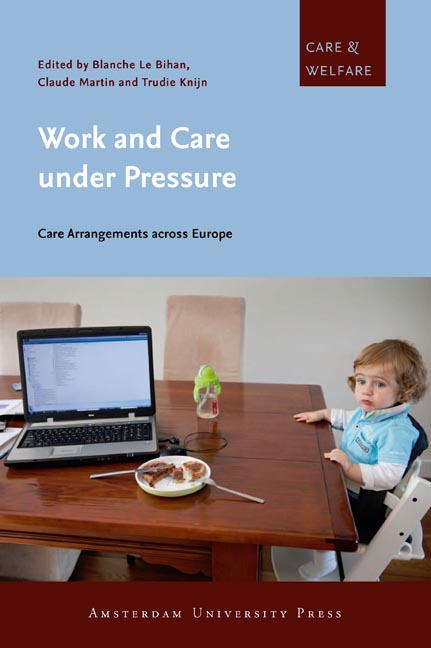Book contents
- Frontmatter
- Contents
- 1 Introduction: Workers under pressure and Social care Arrangements: A Research Framework
- 2 Work-family Balance in the Netherlands: Work and Care Culture Mediating Between Institutions and Practices
- 3 Negotiating Gender Equality, Atypical Work Hours and Caring Responsibilities: The case of Sweden
- 4 Caregiving and Paid work in Germany: The Impact of Social Inequality
- 5 Working Caregivers ‘Living Under Pressure’ in France
- 6 Negotiating Work and care in a Changing Welfare Regime: The case of Portugal
- 7 Blurring Boundaries and Clashing Loyalties: Working and caring in Italy
- 8 The changing mix of care in six European Countries
- About the Contributors
- Care & Welfare
2 - Work-family Balance in the Netherlands: Work and Care Culture Mediating Between Institutions and Practices
Published online by Cambridge University Press: 06 January 2021
- Frontmatter
- Contents
- 1 Introduction: Workers under pressure and Social care Arrangements: A Research Framework
- 2 Work-family Balance in the Netherlands: Work and Care Culture Mediating Between Institutions and Practices
- 3 Negotiating Gender Equality, Atypical Work Hours and Caring Responsibilities: The case of Sweden
- 4 Caregiving and Paid work in Germany: The Impact of Social Inequality
- 5 Working Caregivers ‘Living Under Pressure’ in France
- 6 Negotiating Work and care in a Changing Welfare Regime: The case of Portugal
- 7 Blurring Boundaries and Clashing Loyalties: Working and caring in Italy
- 8 The changing mix of care in six European Countries
- About the Contributors
- Care & Welfare
Summary
Introduction
The experience of working caregivers varies across European countries due to differences in family policies, flexible labour market policies (leave and transition policies) and the availability of care services (for children and elderly people). Comparative research underlines that in the Netherlands, the conflict between work and care is relatively weak compared to other countries in Europe (McGinnity & Calvert 2009; Chung 2011). Heejung Chung found that only one-third of the employed population in the Netherlands reports experiencing problems with fulfilling household tasks due to work obligations, compared with the European average of about 50 per cent. And according to the most recent survey conducted by the European Foundation for the Improvement of Living and Working Conditions, there is a low level of work-life conflict in the Netherlands as well as in the Nordic countries (Eurofound 2010; Chung 2011). Dutch mothers in particular are less likely to report a conflict between work and family life than Swedish mothers (Cousins & Tang 2005). Moreover, according to McGinnity and Calvert (2009), while upper social classes consistently experience higher levels of conflict than lower classes, this is remarkably not the case in Sweden and the Netherlands, where the difference is either non-significant or very small, particularly among women. These findings do not exclude in any way the existence and persistence of gender inequalities both in the labour market and within families (Devreux 2007; Evertsson et al. 2009; Yerkes 2009). Nonetheless they deserve careful consideration, as they represent the experience of women in the juggling of care and work.
The relatively low level of work-family conflict is often explained as a result of policies successfully supporting the reconciliation of work and family. Many studies, usually based on large-scale comparative surveys, approach the differences in the conciliation experience across countries by looking at the relationships between individual attitudes and practices on the one hand, and social policies that facilitate the combination of work and care on the other. However, in doing so, they tend to overlook the mechanisms that mediate between policies, individual attitudes and practices. In our contribution, we argue that the explanations linked to the existence and nature of social policies are necessary but not sufficient.
- Type
- Chapter
- Information
- Work and Care under PressureCare Arrangements across Europe, pp. 33 - 56Publisher: Amsterdam University PressPrint publication year: 2013
- 1
- Cited by



